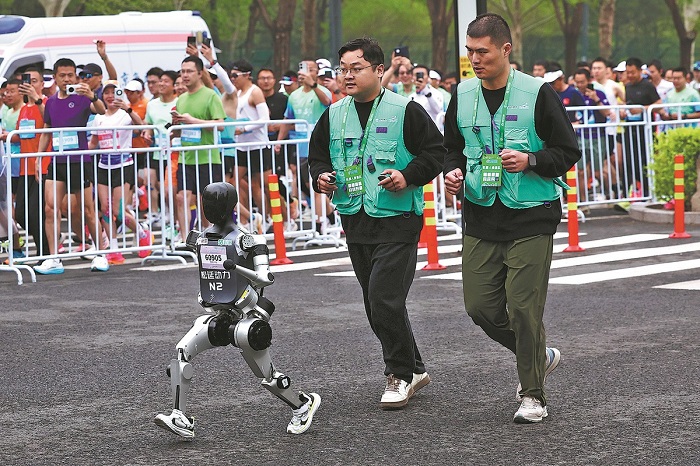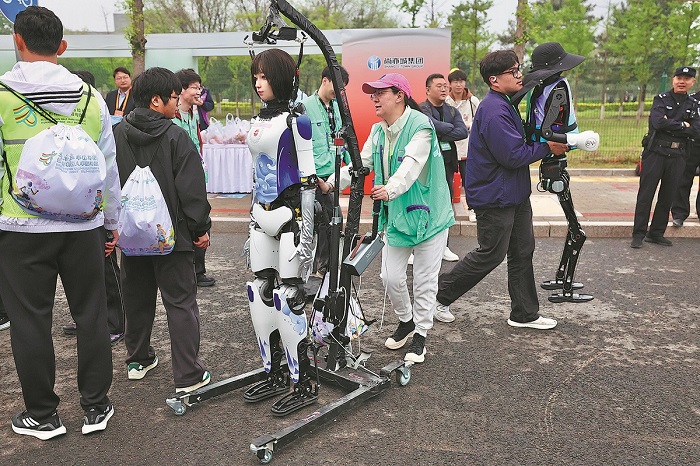China Daily
Updated: 2025-04-22

Technology startup Noetix Robotics' N2 runs in the robot half-marathon in Beijing on Saturday. N2 finished second in the race. [Photo by Wei Xiaohao/China Daily]
The world's first humanoid robot half-marathon, with 20 robots running alongside thousands of human participants, was held in Beijing on Saturday, but it was just the starting gun for China's burgeoning robotics industry, according to executives and experts.
The marathon, despite some imperfect performances like an occasional stumble, proved that China's humanoid robots are moving from flashy laboratory demos to real-world scenarios. In the shadow of the United States' recent tariff hikes, China's advances in artificial intelligence and robotics may stand out as a potent counterstrike, they added.
In the 21-kilometer half-marathon, which tested the physical limits of even some human runners, six of the 20 robots managed to finish the race. Tiangong Ultra, standing 1.8 meters tall and weighing 55 kilograms, won the race with a time of 2 hours, 40 minutes and 42 seconds.
Xiong Youjun, CEO of the Beijing Humanoid Robot Innovation Center, the developer of Tiangong Ultra, said, "The goal wasn't just to cross the finish line, but to test key technologies through the rigors of a long-distance run, then improve technological breakthroughs, and finally, lay the groundwork for robots to enter factories and daily life services."
Xiong said the robots needed compact, heat-resistant joints, precise motion control and strong core algorithms to finish the race. The half-marathon also tested their stability, reliability, battery life and ability to handle complex terrain like slopes and turns.
Liang Liang, deputy director of the management committee of Beijing Economic-Technological Development Area, one of the organizers of the race, said: "The robot half-marathon, the world's first such race, marked a new starting gun for the whole industry. It also sparked deeper public discussion around human-machine coexistence, raised awareness and will help accelerate the development of the robotics industry."
The event came as China accelerates its push to develop humanoid robots, having labeled them as a "strategic frontier" in 2023, when it also set a target of mass production and domestic supply chain security by 2027.
While US companies such as Boston Dynamics and Tesla have dominated headlines with viral demos and futuristic visions, Chinese brands and companies are rapidly catching up — not just in manufacturing but also in mass-producing such robots and making them inexpensive for ordinary people.
For instance, Unitree Robotics, another leading robotics company, priced its G1 humanoid robots at 99,000 yuan ($13,560). Such a price sets them apart from Tesla's Optimus, which is expected to cost between $20,000 and $30,000. The company said it is currently preparing for a globally livestreamed humanoid robot boxing match.
According to a recent report by Leaderobot and nine other institutions, China is on track to produce more than 10,000 humanoid robots this year, accounting for more than half of global output and generating 8.24 billion yuan in sales revenue.

Trainers prepare humanoid robots ahead of the half-marathon on Saturday. Twenty humanoid robots took part in the race in Beijing. [Photo by Wei Xiaohao/China Daily]
With costs falling and ecosystems maturing, the humanoid robot industry is poised to leap from pilot projects to large-scale commercialization. This could give the country a new economic growth engine, the report said.
Signs of commercial traction were emerging in March, when Chinese robotics company UBTech Robotics — a provider of robots to automaker Dongfeng Liuzhou Motor Co — said that Dongfeng would roll out 20 industrial humanoid robots, with full deployment expected during the first half of this year.
Xie Shaofeng, chief engineer at the Ministry of Industry and Information Technology, said at a news conference last week that mainstream humanoid robots in China "are increasingly being deployed in manufacturing scenarios — assisting on auto production lines and supporting smart sorting and logistics".
-
Address
Boda Building, No.15, Ronghua Middle Road, Beijing Economic-Technological Development Area
-
Email
investinbda@bda.gov.cn
-
TEL
+86-010-86409333(24h)
-
FAX
+86-010-67881207







